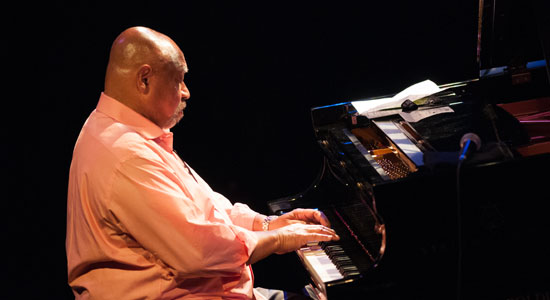
It’s the 37th annual Festival International de Jazz de Montreal. MAGNET’s Mitch Myers translates the action.
Summer greetings from Quebec, Canada. Once again, I’m reporting from the Festival International de Jazz de Montreal. This is the 37th edition of the mammoth music celebration, which is spread over 11 days and nights with more than 350 acts performing on all sorts of stages and venues: indoor and outdoor, paid and free, small and large, day and night. You get the general idea.
I just touched down for a brief visit to the festival, which started on June 29 and runs through Sunday, but in a short time, I found a concentrated dose of sound and lifestyle. The music can range from homegrown to international, vocal to instrumental, mainstream to avant-garde, hardcore jazz to progressive soul, rock, pop, hip hop, blues, world-beat, dance, theatrical and beyond.
On Tuesday evening, I caught an early set by American jazz pianist Kenny Barron, who was honored with the festival’s prestigious Miles Davis Award and hosted three nights of music as part of the fest’s Invitation Series. Barron originally hailed from Philadelphia, back when John Coltrane was still a local wannabe, but he moved to NYC as a teenager, took up with Dizzy Gillespie and evolved into one of the most respected bebop modernists of his time. In classic trio mode with bassist Kiyoshi Kitagawa and drummer Johnathan Blake, Barron played lovely standards, a calypso tune, a Monk composition and some breakneck bebop to boot. These days, Barron is in a class by himself.
From there, I dashed down to the stately Monument-National Theatre to watch Steve Coleman & Five Elements. Coleman, a Chicago-born saxophonist/composer of great renown, led his band of accomplished disciples through a structured set of spontaneous compositions and smart soloing. Coleman has been a leading light in improvised music for decades, and he’s a serious pioneer of concepts and inspiration. At the National, Coleman, trumpeter John Finlayson and guitarist Miles Okazaki played unison lines and etched ruminative instrumental paths over lengthy riffs anchored by bassist Anthony Tidd and drummer Sean Rickman. Heavy stuff, to be sure.
Leaving Coleman’s band before its well-deserved encore, I ran back up the hill to catch Norwegian trumpeter Nils Petter Molvaer. He’s a unique composer/performer, and he played his trumpet through a variety of processed electronic effects, using an atmospheric bed of electro-ambient sounds as his laptop-derived backdrop. Of course, the venue’s light show laid on top of this immersive performance made for a psyche-dreamscape of the highest order. You can’t get much more progressive than Nils Petter Molvaer, and that’s plenty good for me.
Trying to decompress after Molvaer’s presentation, I encountered a free outdoor stage with the dynamic Cambpell Brothers showcasing their wailing trademark of sacred steel guitars. If you’ve never heard of the Campbell Brothers, try to imagine Derek Trucks and Jeff Beck playing twin electric slide guitars at an amped-up church revival prayer meeting. The Campbells were shrewdly invigorating, with their spiritual concept-performance of John Coltrane’s most devout composition, “A Love Supreme.” This was a highflying, supercharged show designed to energize thousands of spectators with booming bass, a big drum solo and loads of screaming guitars jacked up to reach the heavens. Snatches of Sam Cooke’s “A Change Is Gonna Come” filled the air, as did the gospel-derived “Wade In The Water.” Crowd pleasing to say the least, it just goes to show that the Montreal Jazz Festival has a little something for everyone. All you have to do is show up.






